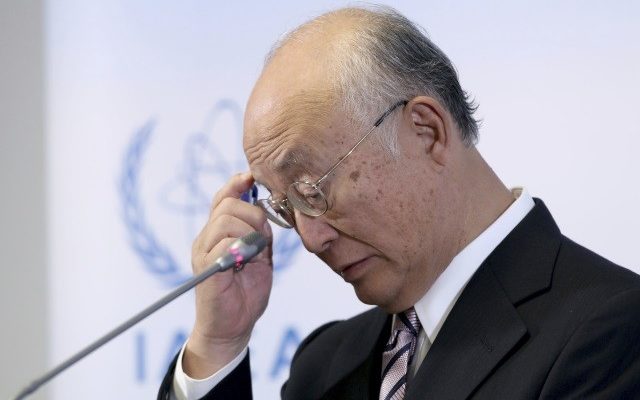Because of Iran’s lack of compliance, the IAEA is not able to fully monitor the nuclear deal, its director warned.
The Director-General of the United Nations International Atomic Energy Agency (IAEA) said that his organization is unable to verify that Iran is implementing the nuclear deal because he does not have the means to ensure that Tehran has not engaged in activities that “could contribute to the development of a nuclear explosive device,” in an interview published Wednesday by Reuters.
IAEA head Yukiya Amano told Reuters that Iran is prohibited from engaging in activities listed in Section T of Annex I of the nuclear deal, which include developing computer simulations of nuclear explosions and designing multi-point explosive detonation systems. He added that his agency does not have the “tools” to verify Iran’s compliance.
“In other sections, for example, Iran has committed to submit declarations, place their activities under safeguards or ensure access by us,” Amano told Reuters. “But in Section T, I don’t see any (such commitment).”
One of the standards that the Corker-Cardin legislation sets out for the President Trump to certify Iran’s compliance is that “Iran is transparently, verifiably, and fully implementing the agreement.”
By Amano’s own admission, the IAEA cannot verify that Iran is “fully implementing the agreement,” because it doesn’t have a way of ensuring that Iran is abiding by the terms set out in Section T.
A Crucial Component of the Deal
The terms of Section T are important, David Albright, a former weapons inspector and head of the Institute for Science and International Security, and Olli Heinonen, a former deputy director-general of the IAEA, explained in a paper published last month.
The paper indicated that the IAEA can demand access to military sites, where Iran likely did its nuclear weapons research on the basis of Section T, even without suspicions that Iran is violating the deal. Ensuring compliance with the terms of Section T and demanding access to military sites, Albright and Heinonen wrote, is “analogous to verifying that allowed activities and equipment are not misused, as is common to many aspects of IAEA safeguards at declared nuclear sites.”
Earlier this month a top Iranian official attacked Amano for saying that the IAEA could demand access to military sites. Ali Akbar Velayati said that Amano “fabricated” the right of his agency to inspect military sites.
Velayati’s verbal attack on Amano’s credibility came just days after the IAEA chief said that his agency had found that Iran was abiding by the deal.
By: The Tower





